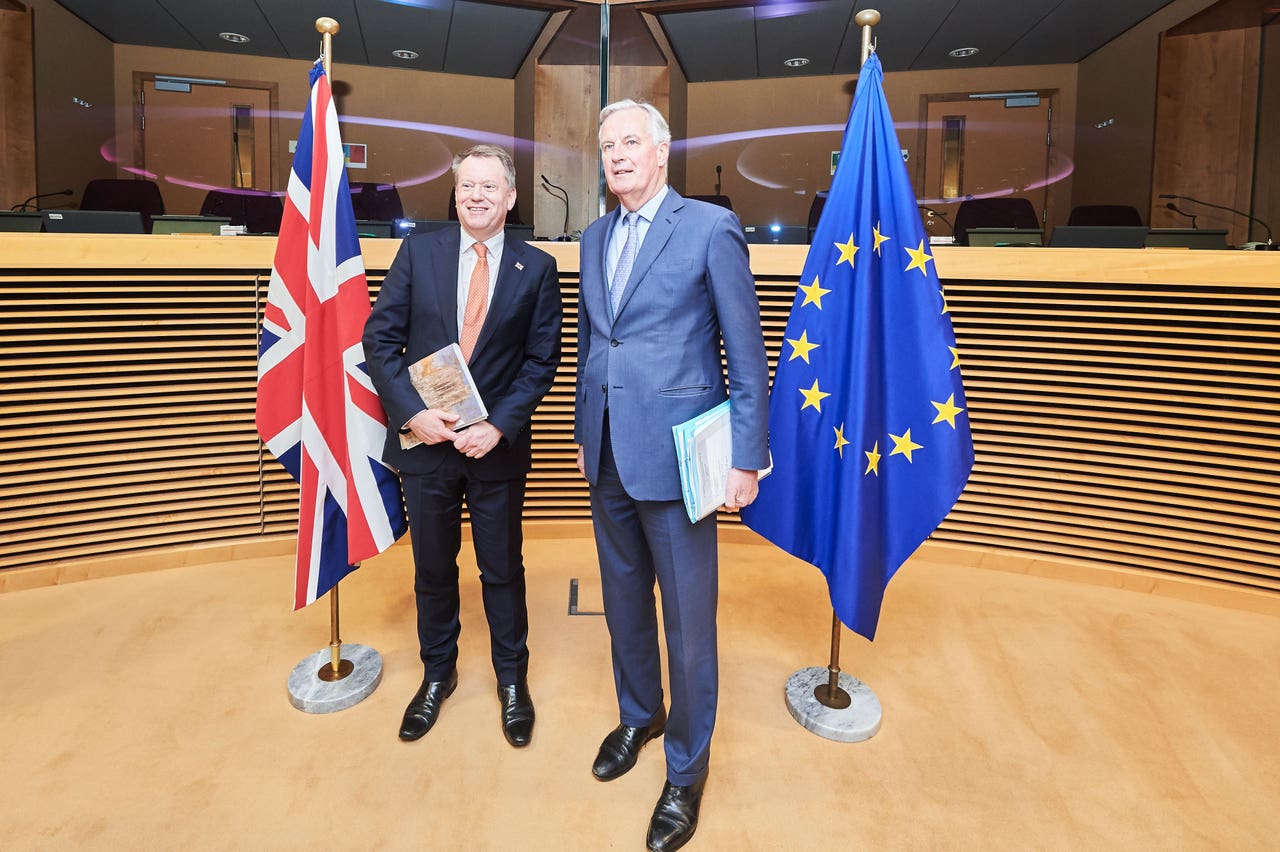UK ‘firm’ against extension of Brexit transition period, says chief negotiator
David Frost insisted that Britain is taking the stance to avoid more ‘significant’ payments to the EU.
/cloudfront-us-east-1.images.arcpublishing.com/shropshirestar.mna/K2HW2QRVZZFJZHX2EF2IHXYKZE.jpg)
Britain is “firm” that it will not extend the Brexit transition period beyond the end of the year, the UK’s chief negotiator with Brussels has told MPs.
David Frost insisted that Britain is taking the stance to avoid more “significant” payments to the EU.
Speaking to the Commons Committee on the Future Relationship with the European Union, Mr Frost said: “That is the firm policy of the Government that we will not extend (the) transition period and, if asked, we would not agree to it.
“And I take that as a given.”
He went on: “I think we have always put a lot of emphasis on economic and political freedom at the end of this year and on avoiding ongoing significant payments into the EU budget.
“And, of course, those things are accomplished by ending the transition period at the end of the year.”
Under the terms of withdrawal from the EU, Britain only has until July 1 to decide whether to extend the transition period.
The comments came as the EU’s chief negotiator, Michel Barnier, said Brussels is “open” to a two-year Brexit delay.
In a letter to the Westminster leaders of the SNP, Liberal Democrats, Plaid Cymru, SDLP, Green Party and Alliance Party, Mr Barnier said the option of an extension to the Brexit transition period is available if the UK wants it.
The leaders of these parties had previously written to Mr Barnier on May 15 calling for a two-year extension to be agreed between the UK and the EU amid the growing negotiations deadlock.
Mr Frost confirmed that Prime Minister Boris Johnson will take part in top-level talks next month on the UK’s future trade relationship with the EU.
He said: “The expectation on both sides is that these are done at leader level.
“And, therefore, yes, the Prime Minister would attend.”
Mr Frost was speaking after the third round of talks with the EU on future trade relationships.
Asked about the role of Dominic Cummings in the Brexit negotiations, Mr Frost said he had never been given an instruction by Mr Johnson’s chief adviser.
Conservative MP Peter Bone asked: “What’s your relationship with Dominic Cummings, do you have to report to him?
“Because he seemed to say this weekend that he was the gatekeeper to the Prime Minister and he decided who spoke to the Prime Minister about what.
“I mean, are you more senior to him or do you have to go through him?”

Mr Frost responded: “I report to the Prime Minister on the conduct of these negotiations and to the committee.
“What I can say is I’ve never had an instruction on these negotiations from Mr Cummings and I don’t think he would expect to give me one.
“He regards me as responsible for the negotiations because the Prime Minister gave me that task.”
Mr Frost appeared to dismiss a suggestion that the UK Government’s Brexit policy could “collapse” without Mr Cummings’ involvement.
Mr Bone asked: “Do you think the whole of the Brexit policy would collapse if Mr Cummings wasn’t there?”
Mr Frost replied: “The Brexit policy is set by the Prime Minister and by the committee, so I’m quite confident that, whatever the arrangement for special advisers, can continue.”
Mr Frost said the UK believes the EU’s approach “in key areas is not a mandate that is likely to produce an agreement that can be agreed with us”.
He told MPs: “If you’re asking do we think the EU needs to evolve its position to reach an agreement, yes, we do.”
Cabinet Office Minister Michael Gove, asked to estimate the number of additional customs declarations UK firms will have to make from January 1 2021, said work is continuing with the business sector to determine the exact number and the staff required to process them.
On fisheries, Mr Frost said Mr Barnier has to work within the mandate given to him by member states – with their “unusual” desire for the Common Fisheries Policy to continue.
He added: “To be fair, Mr Barnier has given a few public signals that he thinks this may not be a completely realistic position and we’ll have to see if they can move forward on that.
“Clearly it’s not a runner for us.”
Mr Gove flatly denied that the Prime Minister has “knowingly misled” the British people over the need for checks in Northern Ireland as part of the Brexit deal.
Mr Frost later said: “One area that presents us problems is their view of our obligations under the ECHR (European Convention on Human Rights).”
He said the UK is committed to the convention, adding: “But what the EU is suggesting is that our internal implementation of those commitments should also be subject to their jurisdiction and we should not be able to change it.”
Dozens of Tory MPs have called for Mr Cummings to quit Downing Street after revelations about his controversial travel arrangements during the coronavirus lockdown.